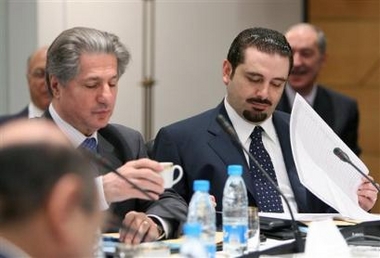 By Henri Mamarbachi – BEIRUT Lebanon’s leaders held fresh talks on Monday focusing on one of the most contentious issues dividing supporters and opponents of Syria – the fate of President Emile Lahoud whom the parliamentary majority wants to oust.
By Henri Mamarbachi – BEIRUT Lebanon’s leaders held fresh talks on Monday focusing on one of the most contentious issues dividing supporters and opponents of Syria – the fate of President Emile Lahoud whom the parliamentary majority wants to oust.
The talks, which resumed after a five-day break, are aimed at ending Beirut’s political paralysis which set in after Syria pulled out its troops after dominating life in its tiny neighbour for some three decades. "Talks focused on one essential subject, that of the presidency of the republic … and this point remains on the agenda for the next session, next Monday," parliamentary speaker Nabih Berri told journalists after the meeting which lasted fewer than three hours. Earlier at the start of the talks, Samir Geagea, head of the former Christian militia, the Lebanese Forces,, told journalists: "We do not expect that the remaining problems will be resolved during Monday’s session." The Lebanese newspapers al-Balad and as-Safir both suggested that the question of the presidency would have to wait for decisions taken at the Arab summit in Khartoum this week.
One MP with the anti-Syrian majority, Bassem al-Sabeh, told al-Mostaqbal: "The Arabs must intervene in the departure of Lahoud", as his presidential mandate was extended by an Arab country — Syria.
Evidence of the gulf between the two sides over Lahoud showed clearly in the decision of Lebanon’s Prime Minister Fuad Siniora to attend the summit in addition to Lahoud, believing this would better represent the country.
"This decision (for Siniora to go) is aimed at making up for the inadequate representation of Lebanon which is limited to the president of the republic," said a government source, who asked not to be named.
The anti-Syrian majority in Lebanon’s parliament have contested Lahoud’s right to represent the country at the summit, arguing that he is only still in office as his mandate was extended by Syria.
In September 2004, the previous Lebanese parliament under Syrian pressure extended Lahoud’s mandate by three years in the face of opposition from a majority of Lebanese and a UN Security Council resolution.
The source pointed out that MPs from the anti-Syria parliamentary majority had already protested at Lahoud’s attending the summit.
In a letter to Arab leaders, they said Lahoud’s participation was an "attack on the constitutional legitimacy" of the country because his position as head of state "resulted from the extension of his presidential mandate by Syria."
Since then, several western powers have effectively boycotted Lahoud.
During a four day visit to Lebanon, Terje Roed-Larsen, envoy of UN secretary general Kofi Annan, did not meet the head of state.
Lahoud indirectly responded to the parliamentary majority’s statement that his presence at the summit was "illegal".
Presidential sources quoted by the press said the renewal of his mandate was constitutional and recognised by the Arab countries since they had invited to their summits as head of state.
Siniora was initially reticent about going to a summit attended by Lahoud but was persuaded after meeting Saudi King Abdullah on Sunday, a diplomatic source told AFP. The source said the king had indicated that Syria was ready to show itself cooperative.
Given the power struggle in Beirut, both Lahoud and Siniora travelled separately on Monday to Khartoum.



